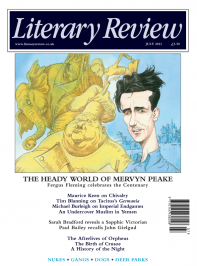John Thieme
‘What Do You Want?’
Last Man in Tower
By Aravind Adiga
Atlantic Books 421pp £17.99
Like his Man Booker-winning The White Tiger, Aravind Adiga’s Last Man in Tower takes a sardonic look at the human consequences of the materialism that has fuelled India’s economic boom. Adiga’s fiction interprets the ‘new’ India for the West and, like Danny Boyle’s more sentimental Slumdog Millionaire and the fiction of Rohinton Mistry, particularly A Fine Balance, the novel exposes some of the harsher realities of Mumbai society. It has much in common with Mistry’s first two books, which, like Last Man, centred their action on the residents of a building.
In Mistry’s case, the occupants of the buildings were members of the Parsi community in which he grew up. Adiga’s perspective is altogether more contemporary and the communal range is much wider. The building in question is Vikram Society, Tower A, located near the city’s Santa Cruz Airport,

Sign Up to our newsletter
Receive free articles, highlights from the archive, news, details of prizes, and much more.@Lit_Review
Follow Literary Review on Twitter
Twitter Feed
Under its longest-serving editor, Graydon Carter, Vanity Fair was that rare thing – a New York society magazine that published serious journalism.
@PeterPeteryork looks at what Carter got right.
Peter York - Deluxe Editions
Peter York: Deluxe Editions - When the Going Was Good: An Editor’s Adventures During the Last Golden Age of Magazines by Graydon Carter
literaryreview.co.uk
Henry James returned to America in 1904 with three objectives: to see his brother William, to deliver a series of lectures on Balzac, and to gather material for a pair of books about modern America.
Peter Rose follows James out west.
Peter Rose - The Restless Analyst
Peter Rose: The Restless Analyst - Henry James Comes Home: Rediscovering America in the Gilded Age by Peter Brooks...
literaryreview.co.uk
Vladimir Putin served his apprenticeship in the KGB toward the end of the Cold War, a period during which Western societies were infiltrated by so-called 'illegals'.
Piers Brendon examines how the culture of Soviet spycraft shaped his thinking.
Piers Brendon - Tinker, Tailor, Sleeper, Troll
Piers Brendon: Tinker, Tailor, Sleeper, Troll - The Illegals: Russia’s Most Audacious Spies and the Plot to Infiltrate the West by Shaun Walker
literaryreview.co.uk